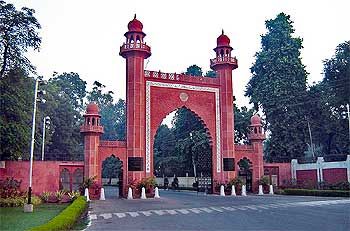 The undercurrent at a fundraising gala for the Aligarh Muslim University hosted in California was one of cautious optimism towards the incumbent government and a hope for assimilation into the mainstream of India’s largest minority.
The undercurrent at a fundraising gala for the Aligarh Muslim University hosted in California was one of cautious optimism towards the incumbent government and a hope for assimilation into the mainstream of India’s largest minority.
More than 400 people attended the 17th annual fundraising gala hosted by the Aligarh Muslim University Alumni Association of Northern California at the India Community Centre in Milpitas, California on September 20.
Established in 1996, the association aims to help underprivileged Muslims in India.
“Our fundraising goal for 2014 is $100,000 for the Aligarh Education Endowment Fund,” Shaheer Khan, co-founder of the association, told rediff.com.
“The annual gala covered 70 per cent of the target. We are an organisation that believes in the kind of modern education that Sir Syed Ahmad Khan, founder of the Aligarh Muslim University, dreamed for Indian Muslims. So they can focus not just on the religious education but study science, technology and engineering,” Khan said.
“I am very grateful for having been an alumnus of AMU. Not only do we learn academic values but also learn values like tolerance and respect for every religion,” Shachindra Nath, president of the association, said.
The keynote speaker for the evening was Islam A Siddiqui, former chief agricultural negotiator in the Office of the United States Trade Representative.
Ambassador Siddiqui said he, his family, even his children, are involved in raising funds for AMU’s cause of education.
Asked what his expectations are from the Narendra Modi government vis-à-vis minorities in India, Siddiqui told rediff.com, “I hope the incumbent government will continue the policies of their predecessors. Former prime minister Manmohan Singh had appointed the Sachar Committee to review the education and economic status of Muslims in India. The review found that Indian Muslims were in fact lagging behind. We hope the current government takes such reports into account when making policy.”
Citing statistics Siddiqui pointed out that only four per cent of Indian Muslims were college degree holders.
“If India wants to be a global power you cannot have one segment of the Indian population lagging behind. Prime Minister Modi says he wants to be the prime minister for all Indians. I am taking his word at face value -- I hope he will continue to look after the minority community and hopefully continue the policies of the previous government too.”
“The people who get rich and well educated don’t need government support. But people who are less fortunate will be a drag on this society if they are not looked after,” he added.
Madrassas, he said, must teach students the subjects that will equip them for the modern world and not just give religious education. Sir Syed wanted that, Siddiqui said, and for that he was opposed by some members of the orthodoxy.
“The Indian diaspora of the Muslim faith need to send the same message as Sir Syed,” Siddiqui concluded.
A highlight of the gala was a mushaira, which saw the participation of poets from both India and Pakistan.











 © 2025
© 2025